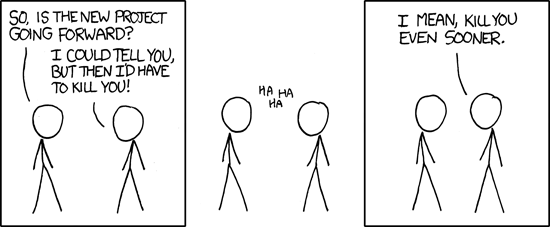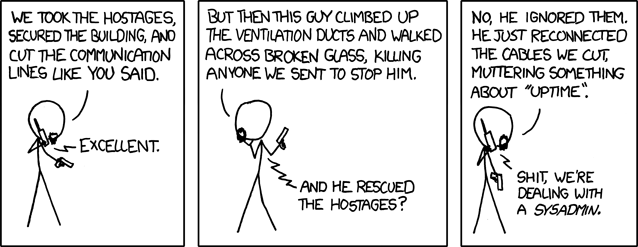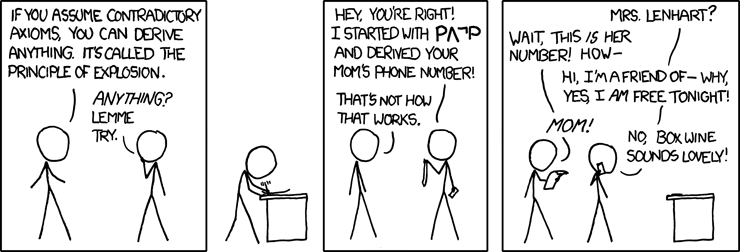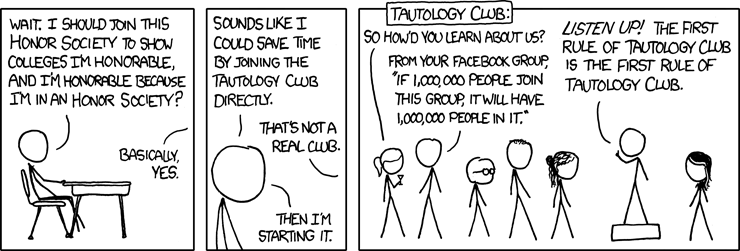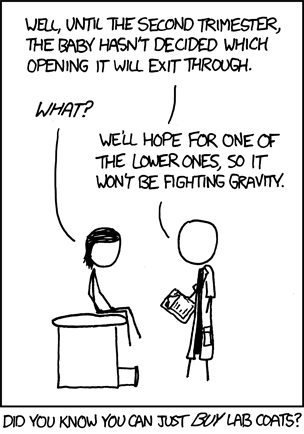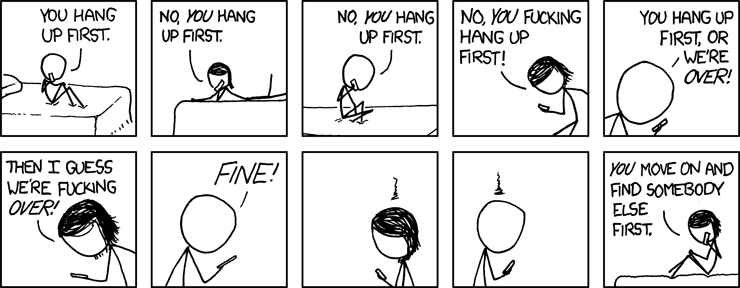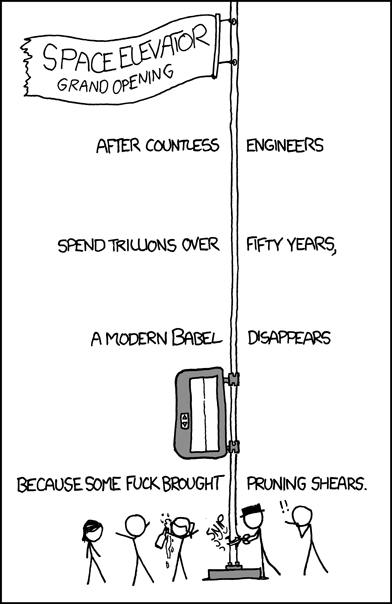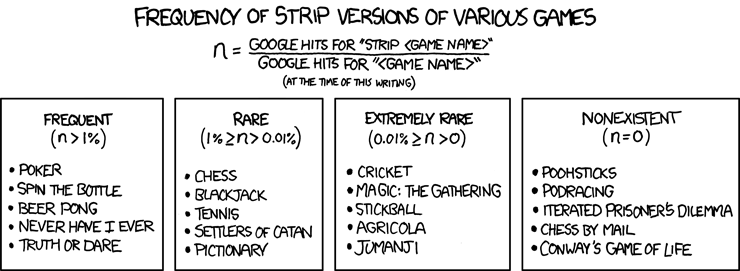Hello, you rotten monsters. I'd like to talk to you about objectivity. It's not too common, but every now and then a cuddlefish comes by and insists that we have no right to talk about XKCD because it's all subjective. This is demonstrably false.
I'm going to start by defining some terms. We may as well start with
objective, shall we? When someone makes an objective statement, they are making a statement which is true independent of the observer. With a
subjective statement, that statement is only true regarding the observer. An objective statement
describes the object; a subjective statement
refers to the subject. An objective statement is not an indelible law of the universe, and no one is claiming it is. If you think that everything which is not stamped on the very foundations of the universe is subjective, you should die.
This does get sticky when describing art, because many sentences are both subjective and objective; that is, they make an observation about the object while simultaneously describing how that observation affected the observer. This is called
criticism.Objectivity Objectively Exists, You Fucking MoronWith the terms out of the way, let's begin properly. This first section is just establishing the fact that objectivity objectively exists in art. Let's begin, shall we?
Anyone who argues that there is no such thing as objectivity in art is demonstrably wrong. I'm a writer, so I'm only going to deal with writing, here. If any visual artists or musicians out there would like to provide examples from their own fields, that would be excellent--I know that there's a lot to both of them and I wish I were versed enough to provide examples.
We'll start with the basics. These are on the level of "so basic people probably forget about them." Every story has a
word count which describes how long it is. Most novels can be described based on how many
chapters there are, and what the
plot of the story is, and who the
characters are.
You can objectively describe these things about any story which consists of them. But it would be really uninteresting to stop there.
You see, every story has
pacing. There is an objective difference between, for instance, the pacing of a comic with a beat panel and the pacing of one without a beat panel. And most stories have a
theme and
motifs that help drive a certain point home. Most stories have
character arcs and similar elements of broad structure.
But also, on a micro level, which is far more important to XKCD, every sentence has objective elements. Each one contains a certain number of
words which affect both the
pacing and
cadence of the sentence and the
complexity of the sentence. Individual words can be objectively described both in terms of their own length, which also contributes to pacing and cadence and so on, but also their
definitions and their
connotations, as well as describing their sound.
Words also have a certain interplay with each other, both in the form of
sentence structure and in the form of how they combine to affect the overall
meaning of a sentence. This interplay also is what turns a sentence from a lifeless combination of descriptions into something which evokes certain emotions and ideas beyond what the words say in their most literal sense. This is a very complex thing, because language is a very complex thing. It is unlikely that every sentence someone composes is entirely original, but it is also very likely that even the most uninspired of individuals have uttered sentences that no human being has ever uttered before. This, combined with the fact that even if I utter the same sentence as someone else, it will be in a different
context and with different subtext, makes the system unfathomably complex. The interplay will
seem (emphasis important) different to different people because they will come to it knowing different things or understanding different things. But this is rather like the stars seeming different to an observer in Australia compared to the stars an observer in Finland might see. This does not change the fact that the stars have objective reality.
Finally, we have
subtext. No words exist in a vacuum. Every word that is written is saying something without saying it. Subtext is a very complex thing, and it requires a lot of careful observation, and in many cases it requires knowledge of events that are removed from the sentence itself. (The other day, a friend said, after I played a certain song by David Bowie, "You know what you need to play now? The same song again." The subtext was that I should put on a very excellent cover of that song that we've both discussed; that subtext was there objectively, and anyone in possession of the knowledge that we both knew and discussed that cover would have been able to piece it together.) Once again, the system can be unfathomably complex.
We Can Describe Things ObjectivelyAnd yet, it can still be described objectively. Now, I am not and have never claimed that there is no subjectivity in criticism. Indeed, the interplay between objectivity and subjectivity is what makes it into criticism rather than simply a rote description. But it can still be described objectively.
I think the best way to describe this is to explain what a critic means when he says "this is bad." Ideally he goes on to explain himself, but this is not an example of pure subjectivity. What he is saying is this: "many of the objective elements in this are ineffective or badly put together, or the ideas, feelings, and thoughts they tend to evoke are otherwise negative." This is partially subjective, certainly--but I will then go on to describe why I think that something is put together. If I dislike the pacing, I will explain how the pacing doesn't flow very well, and tends to be highly disjointed--this is an objective description of the pacing. It does not rely on me as an observer to make it a valid statement. I will then say that I think the pacing is ineffective because of its disjointed flow. This is a subjective statement! You may think the disjointed pacing lends the story a really brilliant, fragmented flow. But when you have finished with a criticism, you should be able to identify precisely what it is about the story (its objective qualities) that evoked that subjective reaction in the writer.
The reviewer's goal is to make the subjective reaction seem as logical and universal as possible--as well, of course, as to make it an entertaining or otherwise worthwhile read.
The Implications of Talent on ObjectivityThere are rules in art. If you practice, you will get better. There is a reason that people who have spent a lot of time studying visual art can produce better pictures than me. There is a reason that skilled photographers take consistently better photographs than amateurs, and that first novels seldom sell. There is such a thing as talent. There is a reason that if you take a class or go to a workshop and listen to criticism on your works, the result is usually that you are better at writing than you were before.
There's also a reason good criticism actually works, and receiving it is one of the most helpful ways for an artist to improve. It's not just about subjectivity, and being able to manipulate your audience. I am fully prepared to acknowledge that there is an art to making something that has mass appeal, and that there are rules to that. But what talent is really about, the way to make something which is truly and lastingly excellent, is in knowing instinctively how all of the objective elements work together to produce the desired effect, to create something which does exactly what you intend it to do.
This is not entirely subjective. Discussing art (even art as terrible as XKCD) can be highly productive and informative, and the interplay between objectivity and subjectivity just as much--for in the end, it's not just criticism which is defined by this interplay, but art itself. If it were exclusively only one thing it would be really boring.
